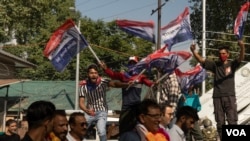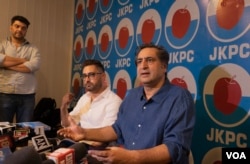New political parties formed after the revocation of Jammu and Kashmir’s special autonomy five years ago appear to be bleeding support ahead of the first regional elections since then. Analysts see perceived ties to the central government in New Delhi as a factor.
Typical of the trend is former lawmaker Noor Mohammad Sheikh, who recently resigned from the Jammu and Kashmir Apni Party, or JKAP, a political group he had joined a few years ago in Indian-administrated Kashmir.
Established in 2020 by Syed Mohammad Altaf Bukhari, a businessman-turned-politician, and Ghulam Hassan Mir, a veteran politician from north Kashmir, JKAP aimed to build a bridge between the local population and New Delhi after Indian Prime Minister Narendra Modi reduced the Himalayan region to a federally controlled territory in August 2019.
Bukhari and Mir successfully recruited over 50 politicians, including Sheikh, from various pro-India parties, giving JKAP a promising start. The party was expected to reshape the political landscape of the region by challenging the dominance of the two main parties — the National Conference, or NC, and the People’s Democratic Party, or PDP.
“Bukhari took the initiative to engage with the government of India during a time of complete silence in the Kashmir Valley,” Sheikh told VOA. “I chose to join the party because I believed I could represent my people when no one else was doing so.”
JKAP, however, suffered an abrupt downfall after a disappointing performance during Indian general elections held earlier this year. With the announcement of the first assembly elections since Indian Kashmir became a union territory scheduled to begin September 18, JKAP began to unravel. Core members of the group started leaving one after another, causing the party to fragment.
“My workers did not support me, so I chose to leave the [JKAP] after three years,” Sheikh said. “My supporters and I held a protest on August 5, and on that very day I decided to contest the election as an independent candidate.”
Noor Ahmad Baba, a prominent Srinagar-based political analyst and professor, told VOA that the central government tried to reshape the politics in Kashmir from above by promoting new political groups in the region, but they couldn’t push aside traditional parties, especially the NC.
“It’s hard to achieve such goals in a country like India. Even a dictator wouldn’t be able to do it. Over time, people have become more politically aware and can analyze things and respond accordingly,” Baba said. “The parliamentary elections indicated that building a new political party takes time and sacrifices and cannot be imposed from above.”
Multiple parties that formed after the region lost its semiautonomous status have faced similar challenges. The Democratic Progressive Azad Party, established by former Chief Minister Ghulam Nabi Azad in September 2022, has lost over a dozen lawmakers, including co-founder Taj Mohiuddin.
Azad, once a close aide to India’s opposition leader Rahul Gandhi, faced criticism from the locals who suspect that he, like lawmakers among other regional upstart parties, has a covert alliance with Modi’s ruling Bharatiya Janata Party.
The suspicion was fueled by Modi’s praise for Azad following his exit from the Indian National Congress. Azad, however, dismisses these claims as attempts to undermine his new political role.
Similarly, the much longer established Jammu Kashmir Peoples Conference, or JKPC, led by separatist-turned-mainstream politician Sajad Lone, is losing ground. Many attribute its decline to Lone’s alleged closeness to Modi.
Many politicians who left these upstart parties are now running as independent candidates. They say that elections attract “new combinations and shifting allegiances.”
“I left JKPC for my own survival,” Nizam Ud Din Bhat, a former lawmaker from north Kashmir’s Bandipora district, told VOA. “My voters and workers wanted me to contest election from my home district as an independent candidate.”
Muzamil Maqbool, another analyst and a political commentator, believes that public pressure has forced many individuals to run independently.
“People like the work done by some of these candidates but they do not like the political party they represented,” he said.
“However, we cannot ignore the fact that these independent candidates could join hands with any leading political party in the assembly elections by October this year,” he said. “Horse trading in politics is not a new thing and in Kashmir; it is often the only way for politicians to secure their future and survive.”
Professor Baba believes that those who switched parties during tough times and aligned with New Delhi may face difficulties.
“People now understand that such individuals are motivated by a desire to cling to power,” Baba said. “I believe it might cost them in the upcoming elections.”
JKAP co-founder Hassan Mir told VOA that emotional politics played by other parties has impacted people for decades.
“Every political party is referred to by various names, but if the vision and agenda are clear, it’s crucial to persuade people regardless of the labels attached,” he said. “Some members departed because they sought power and realized we couldn’t provide it while others left due to unmet expectations regarding their mandates.”
Wasim Nabi contributed to this story.






